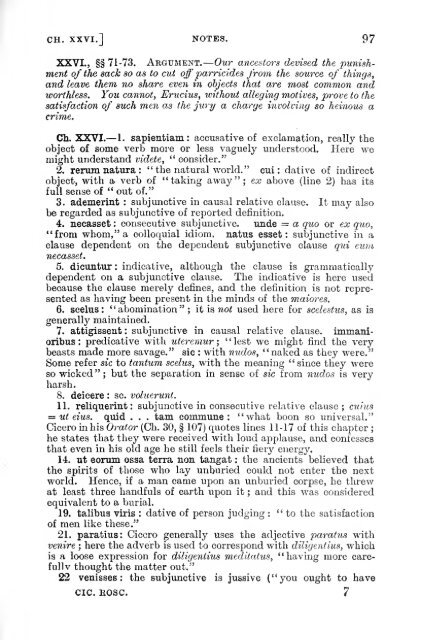Pro S. Roscio Amerino
Pro S. Roscio Amerino
Pro S. Roscio Amerino
You also want an ePaper? Increase the reach of your titles
YUMPU automatically turns print PDFs into web optimized ePapers that Google loves.
CH. XXVI.] NOTES. 97<br />
XXVI., §§ 71-73. Argument.— Our ancestors devised the punishment<br />
of the sack so as to cut off parricides from the source of thinga,<br />
and leave them no share even in objects that are most common and<br />
worthless. You cannot, Erucius, without alleging motives, prove to the<br />
satisfaction of such men as the jury a charge involving so hehious a<br />
crime.<br />
Ch. XXVI.— 1. sapientiam : aeeusative of exclamation, really the<br />
object of some verb moie or less vaguely understood. Here we<br />
might understand videte, " eonsider."<br />
2. remm natura : " the natural world. " cui : dative of indirecfc<br />
objecfc, with a verb of "taking away"; ex above (line 2) has its<br />
fuU sense of " out of."<br />
3. ademerint : subjunctive in causal relative clause. It may also<br />
be regarded as subjunctive of reported definition.<br />
4. necasset : consecutive subjuncfcive. unde = a quo or ex quo,<br />
"from whom," a colloquial idiom. natus essefc : subjunctive in a<br />
clause dependent on the dependent subjunctive elause qui eum<br />
necasset.<br />
5. dicunfcur : indicative, although the clause is grammatically<br />
dependent ou a subjunctive clause. Tlie indicative is here used<br />
because the clause merely defines, and the definition is not represented<br />
as having been present in the minds of the maiores.<br />
6. scelus: " abomination " ; it is not used here for scelestus, as is<br />
generally maintained.<br />
7. attigissent : subjunctive in causal relative clause. immanioribus<br />
: predicative with uteremur; "lest we might find the very<br />
beasts made more savage." sic : with nudos, "naked as they were."<br />
Some refer sic to tantum scelus, with the meaning "since they were<br />
so wicked" ; but the separation in sense of sic from nudos is very<br />
harsh.<br />
8. deicere : sc. voluerunt.<br />
11. reliquerinfc: subjunetive in consecutive relative clause ; cuius<br />
= ut eius. quid . . . tam commune : "what boon so universal."<br />
Cicero in his Orator (Ch. 30, § 107) quotes lines 11-17 of this chapter ;<br />
he states that they were reeeived with loud applause, and confesses<br />
that even in his old age he still feels their fiery energy.<br />
14. ut eorum ossa terra non fcangat : the aneients believed that<br />
the spirits of those who lay unburied eould not enter the next<br />
world. Hence, if a man eame upon an unburied corpse, he tlurew<br />
at least three handfuls of earth upon it ; and this was considered<br />
equivalent to a burial.<br />
19. talibus viris : dative of person judging : " to the satisfaetion<br />
of men like these."<br />
21. paratius: Cicero generally uses the adjective paratus with<br />
venire ; here the adverb is used to correspond with diligentius, which<br />
is a loose expression for diligentius meditatus, "having more carefullv<br />
thought the matter out."<br />
22 venisses : the subjunctive is jussive ("you oughfc fco have<br />
CIC. EOSC. 7

















